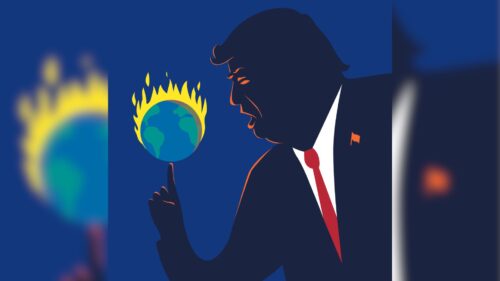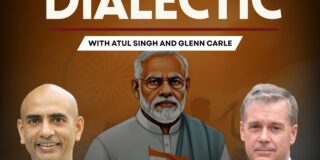The fight to shape power dynamics in the Middle East is a long one. In 2020, US President Donald Trump’s administration mediated the Abraham Accords, normalization agreements between Israel and the Arab nations of Bahrain and the United Arab Emirates. Morocco and Sudan later signed on as well. The next big breakthrough seemed to be on the horizon as Saudi Arabia, Israel and the US were negotiating a peace deal.
The trend of Arab–Israeli normalization pushed both Palestine and Iran to the sidelines. Hamas, backed by Iran, sought to change that. Hamas attacked Israel on October 7, 2023. The attack and the subsequent war not only brought the Palestinian issue to the front and center of discourse once again but also re-injected Iran into the fight for regional power.
The Israel–Hamas war created a crack in regional power dynamics
Iran now has an opening where it didn’t have one before. Of course, it is as they say in the business world: Never invest with your own money. Iran used Hamas to break into the fight for regional power, and it will continue with that tactic. Terrorist groups such as the Houthis and Hezbollah offer Iran the chance to upend the fragile regional dynamics. Not only this, but Iran can also threaten increasingly brittle global trade.
It is no secret that non-geographically centered power wins over geographically-centered states. Iran can strike from many places at once, stretching the US capacity to respond thin. As in the US–Vietnam War, asymmetric warfare has proven to be wildly successful in upsetting what seemed to be a one-sided power dynamic. In backing and funding groups such as Hamas and the Houthis, Iran is now broading the focus of attention. No longer is the world only focused on the Israel–Hamas war; the focus is increasingly on Iran as a player with growing influence.
The big powers of the Middle East find themselves, much like Odysseus’ crew, caught between Scylla and Charybdis. Saudi Arabia in particular is feeling the strain. On one hand, war with Israel is the last thing Saudi Arabia wants. But on the other, its majority Sunni Muslim population views Saudi leaders as ignoring the sentiments of their citizens. The hearts of the Arab street, of course, are with their fellow Muslims in Palestine. Thus, regional leaders risk being viewed as either spineless or corrupt. Iran has thus thrown a wrench in the Arab monarchy’s plans.
The ripples Iran is making spread far beyond the geographical confines of the Middle East, too. The Iran-sponsored Houthis are attacking shipping vessels in the Red Sea from their base in Yemen. Through them, Iran is doing damage to intercontinental trade and thus to the entire global economy.
The US is beginning to feel the strain. Iran and its allies are carrying out strikes in the Red Sea, Syria, Iraq and Pakistan. Russia and China may seize the opportunity to move into the area as the US has its back turned. Even India has sensed the rising tension. While it knows it must maintain connections with Iran, it must also uphold the principle of free trade on the high seas that Iran is attacking. So, India and other nations outside the region are beginning to stress.
From a unipolar world to multiple spheres of influence
The Israel–Hamas war may have lasting consequences globally. Ukraine, in particular, has lost much from the aftermath of October 7. As the US diverts its aid to Israel and the Red Sea, aid cannot make its way to Ukraine. The Biden administration is finding it harder and harder to divide its support between Israel and Ukraine.
The unrest in the Middle East affects the US domestically too. The US public is divided between supporting Israel or Palestine. The Left criticizes the administration for refusing to call a ceasefire. The Right accuses the administration of being complicit with Hamas. Once again, the two-party divide seems to have weakened US coherence, actions and influence.
Weakened influence isn’t the only danger that comes with a divided US public. The public struggles to understand why the US should be involved in any conflicts in the Middle East. This raises the temptation for US leaders to disengage from the region or even from the world at large. Disengagement will guarantee chaos. De facto spheres of influence will shape international transactions rather than a Western-backed, unipolar system.
In other words, what we know of the normative order is collapsing right in front of our eyes.
This impending chaos will change everything from the price of pencils to how a war is waged. The Israel-Hamas war is a chip off the world order. We will no longer be facing a unipolar world order with the US on top. Rather, we face a multipolar one.
Decentralization of power has already begun. US influence in the Middle East, which is the successor to European colonialism in the region, is losing its rationale in the eyes of American citizens and of the world. The Israel–Hamas war is the straw that broke the camel’s back. The domino effect has now cascaded from the region onto the global stage.
The normative system is now being replaced, and no one knows what the coming multipolar order will be like.
[Cheyenne Torres wrote the first draft of this piece.]
The views expressed in this article/podcast are the author’s own and do not necessarily reflect Fair Observer’s editorial policy.

















Comment